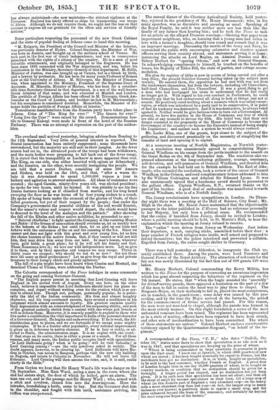The overland mail arrived yesterday, bringing advices from Bombay to
the 12th September. Very little of general interest is reported. The Sontal insurrection has been entirely suppressed; some thousands have surrendered, but the majority are still safe in their jungles. As the fever season had set in, the advanced posts of the troops had been withdrawn, and the main bodies were preparing to fall back out of the fever range. It is stated that the tranquillity at Lucknow is more apparent than real. The King, on one side, was either besotted with opium or debauchery ;
and the fanatics, on the other, were secretly instigating the people. We are told that a secret Durbar, consisting of some 200 Ameers and Birders, was held on the 18th, and that, " after a warm de- bate it was determined to spend 1,500,000 rupees a year in bribery and agitation to prevent annexation. All ideas of resistance were scouted ; the aged Cassim, ninety-five years old, was elected president; he spoke for two hours, until he fainted. It was pitiable to see his fine 'ranee features looking as if chiselled from marble, and his long beard sweeping the floor as he was borne off by four young Birders to a couch. He spoke of being born under the crescent of the glories of Oude, of their fallen greatness, but yet of their respect by the people; that under the Company's government the peaceful children of the soil would flourish, but the ameer's valour and respect would depart, the chiefs would have to descend to the level of the mahajun and the pariach." After showing the fall of the Khalsa and other native nobilities, he proceeded to say— "Beloved chieftains ! to fight against the Company is like resisting Moukir and Nakir: if the Erman of annexation should overtake us, let us meekly bow to the behests of the Birkar ; but until then, let us gird up our loins and behave with the endurance of the ox and the cunning of the fox. Since we cannot and dare not fight with this great and ever young lion, let us hire the choice hunters of his native forests, that, if they cannot or will not kill him, they may drive him away from our land. In man's bosom, wherever born, gold holds a great place; for it lie will sell his family and God. These Nazarenes love it; we love our wild independence more. Let us give it to them, and by their speeches and tongues we may escape. Thrice in thirty years we escaped ; why should we not do so now ? Are not these men the same as their predecessors? Let us give from the royal and private treasures to their hungry chiefs and greedy agitators."
The fall of a pin might have been heard when Cassim and Mostaid, the fanatical Ulema ul TJlema, were addressing the Durbar.
The Calcutta correspondent of the Times indulges in some comments on the going and coming Governor-GeneraL
"The English papers persist in asserting that Lord Canning will leave England in the second week of August. Every one here, on the other hand, believes it impossible that Lord Dalhousie should leave his plans in- complete, and depart without waiting even for the ovation which is so cer- tain to attend him. Though not, perhaps, personally popular, he is politi- cally the idol of the Indian community. His firm and almost haughty character, and his long-continued success, have created a confidence in his judgment which almost amounts to loyalty. His greatest enemies qualify their depreciation with an acknowledgment of his surpassing ability, and men of the greatest audacity shrink from a contest with one whose pen brands as well as defeats them. Moreover, it is scarcely possible to explain to those who live under a constitution the vital importance to India of the personal character of a Governor-General. He begins and ends everything. If he is weak, the Ad- ministration goes to pieces, and we are fortunate if we escape some mighty catastrophe. If he is a hunter after popularity, every rational improvement is given up in deference to native clamour. If he is lazy or sickly, or ad- dicted to Simla, the administration stops. It is an engine with one crank : if that stops on its centre, there is either a pause or a smash. For all these reasons, and many more, the Indian public occupies itself with speculations. 'Is Lord Dalhousie going ? when is he going ? will he visit Calcutta ? is Lord Canning coming ?'—are the only questions asked in society. The doubt appears, however, to be clearing up. Lord Dalhousie will leave Ma- dras in October, run across to Rangoon,sperhaps visit the new city building on Negrais, and return to Calcutta in November. He will not leave till February. Lord Canning will then assume the reins, and, it is said, reside chiefly in the Hills."
From Ceylon we hear that Sir Henry Ward's life was in danger on the 7th September. Miss Kate Ward, seeing a man in the room where she and her sisters slept, the door of which he bolted, gave an alarm. The man ran out, and in the passage met Sir Henry Ward ; who, armed with a stick and revolver, chased him into the drawingroom. Here the intruder, brandishing a knife, came to bay. But the Governor shot him in the shoulder, and fought with him until, assistance arriving, the ruffian was overpowered.


































 Previous page
Previous page